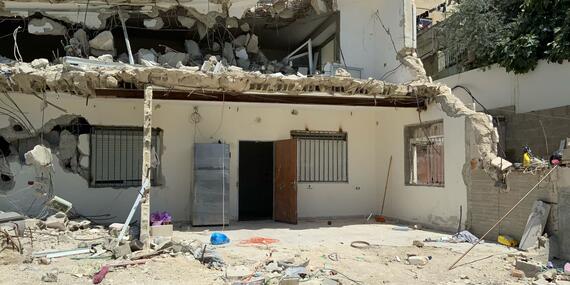Today's top news: Sudan, Occupied Palestinian Territory, Ukraine

Sudan
In a statement issued today, Sudan's Resident and Humanitarian Coordinator, Clementine Nkweta-Salami, expressed shock over reports of violent attacks yesterday and a high number of casualties in the village of Wad Al-Noura in Aj Jazirah State.
The UN has received credible reports of heavy gunfire and the use of explosive weapons in populated civilian areas where the Rapid Support Forces have confirmed they have been involved in ground operations.
The Resident and Humanitarian Coordinator called for international humanitarian law to be upheld and for those responsible for crimes to be held accountable.
Meanwhile, the World Food Programme (WFP) is urgently expanding emergency food and nutrition assistance in Sudan amid the looming threat of famine, as conditions for civilians deteriorate.
The scale-up aims to provide life-saving food and nutrition assistance to an additional 5 million people by the end of this year, doubling the number of people WFP had planned to support at the start of 2024. WFP will provide cash assistance to 1.2 million people in 12 states, giving a vital boost to local markets and food producers. The agency is also working with smallholder farmers, many of them displaced by conflict, to boost wheat production.
The International Organization for Migration is warning that the number of people displaced by conflict inside Sudan could top 10 million in the coming days. This includes 2.8 million displaced prior to the April 2023 war, and 7.1 million since. More than half of all internally displaced people are women and girls, and over a quarter are children under the age of five.
This is in addition to the 2 million people who have fled to neighboring countries – principally Chad, South Sudan and Egypt.
Occupied Palestinian Territory
Fewer than 100,000 people remain in Rafah governorate following the flight of about a million people, who were again on the run, moving toward Khan Younis and Deir al Balah.
Military operations have significantly destabilized humanitarian aid flows forcing UN and partners to reorganize their entire operations.
As things stand, aid convoys still need to navigate active hostilities, barely passable roads, unexploded ordnance and recurrent delays.
The humanitarian community is engaging with the Israeli authorities to ensure sustained, secure and unimpeded access for humanitarian aid into and within the Strip. It has also engaged with local communities to tackle lack of law and order by protecting convoys from takeover.
The closure of Rafah has also reduced fuel supplies, affecting trucks, hospitals, sewage systems, desalination operations and bakeries.
Meanwhile, the head of the World Health Organization, Dr. Tedros Adhanom Ghebreyesus, warns that insecurity and the ongoing closure of the Rafah crossing continue to compromise efforts to get supplies and staff into and around Gaza. He says intense hostilities have severely crippled health care in Rafah.
Over the past eight months, WHO has documented more than 460 attacks on health care in Gaza.
More than 100 health facilities and upwards of 110 ambulances were affected. Over a third of the attacks were in Gaza city, nearly a quarter in northern Gaza, and more than a quarter in Khan Younis.
WHO underscored that health care is not a target, and that civilians and health care must be actively protected.
The head of UNICEF, Catherine Russell, warned yesterday that with the summer heat and lack of water, food and health care in Gaza, deadly diseases could soon run rampant. She said the children of Gaza are living alongside mountains of trash and raw sewage as basic services reach a breaking point, amid ongoing fighting and displacement.
UNICEF says most of Gaza’s water systems have been heavily impacted or rendered non-operational due to infrastructure damage, lack of fuel, and the security situation.
On the West Bank, the Humanitarian Coordinator for the Occupied Palestinian Territory, Muhannad Hadi, said yesterday that although all eyes are on Gaza, the situation in the West Bank remains volatile – with houses demolished, infrastructure destroyed and health facilities attacked.
Hadi was speaking during a visit to the central West Bank, where he and Member States heard from Palestinian herding and Bedouin communities, as well as the organizations supporting them. They spoke of their concerns over the humanitarian impact of heightened violence, settler activities, access restrictions, demolitions and other coercive policies and practices.
The Humanitarian Coordinator stressed that the people of the West Bank must be supported, saying we cannot let the West Bank become another Gaza.
Ukraine
OCHA reports that attacks impacting humanitarian operations continue in Ukraine. The UN Refugee Agency says three staff members of their national partner organization, Humanitarian Mission Proliska, came under artillery fire yesterday while delivering humanitarian aid in the Zaporizhzhia Region, in southern Ukraine. There were no casualties reported, but the car marked as humanitarian was damaged.
Meanwhile, attacks yesterday and today in the Dnipro and Donetsk regions, in central and eastern Ukraine, caused civilian casualties and damage to civilian infrastructure, according to local authorities.
Millions of people in the Dnipro, Donetsk, Kyiv and Odesa regions, as well as Kyiv City, have been suffering from electricity interruptions resulting from damage to energy facilities, as reported by the national energy company.
Today also marks one year since the destruction of the Kakhovka Dam, which unleashed massive flooding in the Kherson Region. The floods displaced families, disrupted water supplies, and damaged homes and livelihoods. The UN and humanitarian partners urgently mobilized to provide assistance to affected communities.
